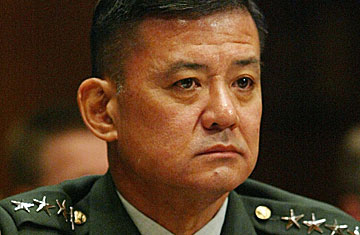
General Eric K. Shinseki
President-elect Barack Obama has chosen retired General Eric Shinseki, who voiced the first, lone dissent of the Bush Administration's cut-rate plan for the Iraq war, to head the Department of Veterans Affairs (VA). The move shows Obama's deep concern for the needs of wounded veterans. More poignantly, it marks a comeback for an Army officer who was spurned by his superiors, then Defense Secretary Donald Rumsfeld and his deputy, Paul Wolfowitz, for warning that the war's post-invasion phase would require many more troops than the Pentagon believed.
"No one will ever doubt that this former Army chief of staff has the courage to stand up for our troops and our veterans," Obama said at the Chicago press conference at which he announced his choice of Shinseki. "No one will ever question whether he will fight hard enough to make sure that they have the support that they need."
Standing on stage with Obama, Shinseki, who was the first Asian American to reach four-star rank, pledged to provide American military personnel "a smooth, error-free, no-fail, benefits-assured transition into our ranks as veterans." Achieving that goal, he added, "is our responsibility, not theirs." Shinseki knows about wounded veterans — he lost the front half of his right foot in Vietnam, where he earned two Purple Hearts.
Like Obama, he hails from Hawaii. Unlike Obama, he's of Japanese heritage. That makes Obama's announcement of his appointment on the 67th anniversary of the Japanese attack on Pearl Harbor especially meaningful.
Shinseki has avoided the public eye since retiring five years ago. One month before the Iraq War began, he testified before Congress that several hundred thousand soldiers would be needed to secure Iraq after the U.S. invasion, far more than the Administration had said were needed. He supported the military tradition of preparing for the worst, deploying more troops than might be necessary and then bringing the surplus home. He accurately predicted that ethnic tensions would trigger violence in Iraq and require significant ground forces to contain. The war ultimately required a "surge" of 30,000 additional troops beginning in January 2007, validating Shinseki's premonition. But Rumsfeld and Wolfowitz had belittled his assessment.
"Beware a 12-division strategy for a 10-division Army," Shinkseki warned at his retirement ceremony, an event attended by neither Rumsfeld nor Wolfowitz. It was a public rebuke that sent a shiver through the officer corps, and made clear that professional dissent — however carefully considered and delivered by a top officer with 38 years in uniform — could derail an exemplary career. (Contrary to public perception, however, Shinseki was not fired by Rumsfeld. He served out his term as Army chief of staff, although Rumsfeld's allies had already hacked away at Shinseki's influence by proclaiming him a lame duck during his final year, even before his controversial testimony.)
Yet praise for Shinseki, 66, needs to be calibrated. While he believed that more troops were needed in post-invasion Iraq, he didn't believe it strongly enough to lay down his four stars and resign. His supporters tend to overlook just how meek his public challenge to Rumsfeld was. He never volunteered it. Senator Carl Levin had to extract it from him, slowly and painfully, during a Senate hearing. That's when, in February 2003, Shinseki said he felt that "something on the order of several hundred thousand soldiers" would be needed. Forty-eight hours later, it was the derisive reaction of Wolfowitz, who never served in the military, that Shinseki's estimate was "wildly off the mark" that cemented Shinseki's legacy. (Many soldiers still haven't forgiven him for outfitting the entire Army in the distinctive black berets once reserved for its elite Rangers.)
Shinseki's new assignment is likely to be tougher than running the U.S. Army. The role of the VA is to deal with the post-post-invasion costs of war, including health care, education and disability benefits for the 24 million American military members who have served their nation. The agency has an annual health-care budget of close to $100 billion, nearly double what it was a decade ago. The recent rising tide of post-traumatic stress disorder among vets is now costing the VA $4 billion a year, which includes a hiring spike in mental-health professionals, from 13,000 two years ago to 17,000 today. And the VA's caseload is rising with the burdens of the two wars in Afghanistan and Iraq: Close to one million military personnel who have served in those countries have shed their uniforms, and about a third of that total have visited the VA for care or benefits.
History may come full circle, fittingly and bittersweetly, if, during his confirmation hearings, Shinseki says his new agency needs far more personnel than the 240,000 it currently employs to tend to the human carnage.
